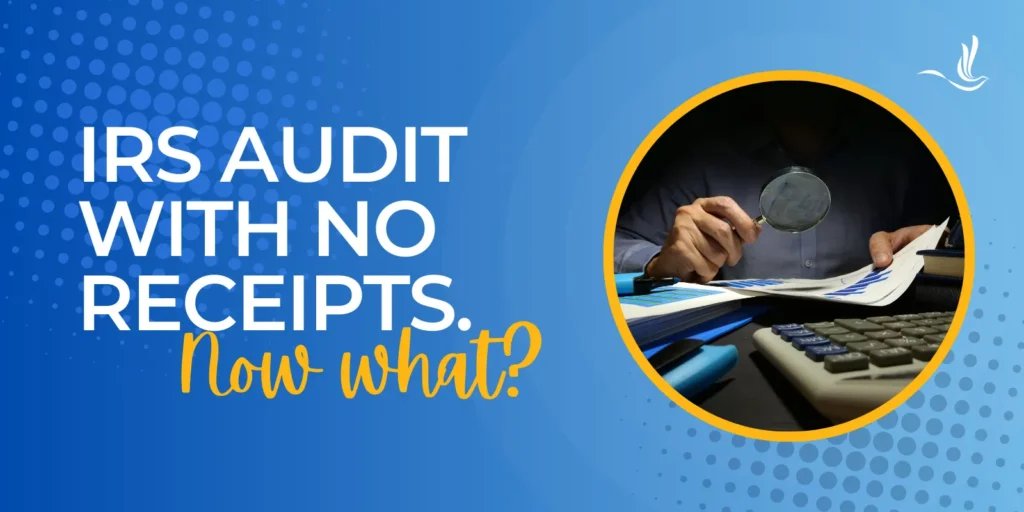
Facing an IRS audit can be stressful, especially if you lack the receipts to back up your deductions or claims. While the lack of receipts can complicate things, it’s not an insurmountable issue. The IRS understands that documentation can sometimes be lost or unavailable and provides methods to reconstruct records and use alternative documentation. By remaining calm, organized, and proactive, you can navigate the audit process successfully. Here’s a detailed guide on how to navigate this challenging situation with specific examples.
Stay Calm and Get Organized
The first step is to remain calm and avoid panic. We know that’s easier said than done but it really is a crucial step in an IRS audit. Start by organizing any documentation you do have. For example, if you’re missing receipts for business meals, you might still have credit card statements: These can show the date, amount, and place of the transaction, which can help substantiate the expense. Other alternatives may be calendar entries or even notes about business meetings that correspond to the dates of the meals.
Understand the Scope of the Audit
Figure out exactly what the IRS is questioning. If the audit focuses on specific items, such as travel expenses, concentrate on gathering information related to those claims. For example, if you claimed a large deduction for travel, focus on flight itineraries, e-tickets or booking confirmations. You can also look for digital or print copies of hotel bills and car rental agreements.
Use Alternative Documentation
Even if you don’t have traditional receipts, other forms of documentation can serve as evidence as shown in the scenarios above. The main forms of alternative documentation are bank and credit card statements: These can show proof of payment for business-related expenses. For instance, a credit card statement showing a purchase at an office supply store can support your deduction for office supplies. Invoices and bills can substantiate purchases from vendors or service providers. If you regularly purchase materials from a supplier, ask them for copies of past invoices. Emails and contracts are helpful. An example would be if you paid a contractor for work on a project and communicated via email. For vehicle expenses, you may have used a mileage log detailing each trip, including dates, destinations, and purposes. This, along with photos of your odometer at the start and end of the year, can also support your mileage claims.
Employ the Cohan Rule
The Cohan Rule allows taxpayers to estimate expenses when receipts are not available. Just make sure your claims are reasonable and factual. Also, keep in mind that the IRS does set several limitations to this rule. For example, you can’t claim expenses like business meals, travel, and business gifts without receipts. You also cannot claim charitable contributions without documentation.
Be Honest and Cooperative
Honesty is crucial when dealing with the IRS. For example, if you claimed a deduction for a business expense but lack the receipt, provide a truthful explanation. You may need to provide a written statement explaining the nature of the expense, why the receipt is missing, and any other supporting information. You should also provide as much supplementary evidence as possible to support your claim.
Negotiate a Settlement
If you can’t substantiate all your claims, consider negotiating with the IRS. For example, you can try to negotiate a tax settlement through an Offer in Compromise. Alternatively, you can apply for an installment agreement, a payment plan to manage your tax liability over time.
Learn and Prepare for the Future
Use this experience to improve your record-keeping practices. For instance, you can use digital tools to track expenses and store receipts electronically. It’s also a good idea to periodically review your records to ensure they are complete and accurate, making future audits easier to handle.
Seek Professional Help
Hiring a tax professional can be invaluable. For example, if you’re unsure how to present your case, an accountant or tax attorney can analyze your situation and help identify what documents are critical and how to obtain them. They can also communicate with the IRS to handle discussions with the IRS on your behalf, presenting your case clearly and effectively. Most importantly, they can work to reduce any potential penalties or negotiate a settlement.
Tax Help for Those Being Audited by the IRS
Being audited without receipts can be stressful, but with a methodical approach, you can navigate the process effectively. Stay organized, use alternative documentation, consider the Cohan Rule, and seek professional help if necessary. By being honest and cooperative, you can manage the audit and minimize potential penalties. Use this experience to enhance your record-keeping practices, ensuring smoother tax filings in the future.
If You Need Tax Help, Contact Us Today for a Free Consultation